This content is being reviewed in light of recent changes to federal guidance.
Counterpublics, Public Intellectuals, and Exodusters: An Interview with Frank Farmer (Part II)
We are pleased to conclude our two-part interview with Frank Farmer, a leading figure in Composition Studies and Rhetoric who recently retired from KU after joining the English faculty in 2000. Among many topics covered in this conversation, Farmer discusses public intellectuals, Nicodemus, KS, and what’s in store for him next. This interview has been edited for length and clarity, but you may read the full interview here.
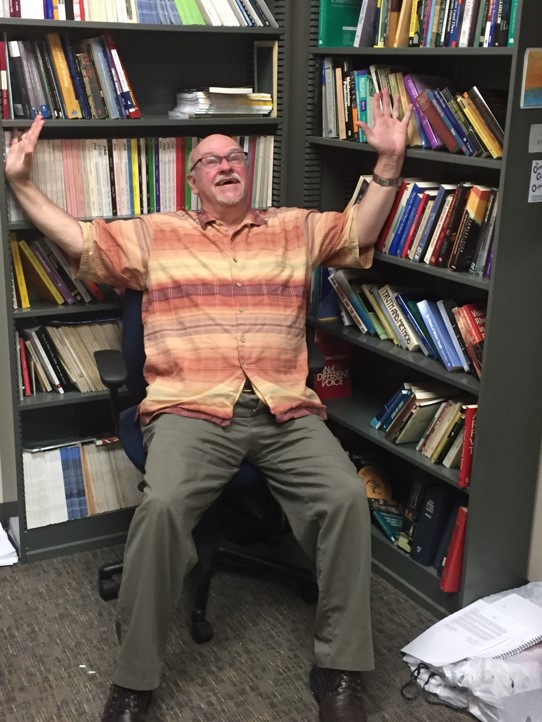
Part II. The Counter Public Intellectual and P(l)aying it Forward
Peace: The word or the phrase “public intellectual” comes up a lot, and I see that phrase when I read in rhetoric and composition. What would you say a public intellectual is? I know you kind of compare it to composition study’s position in the public sphere saying that people do not believe that it was legitimate or not in style. We used style differently. We aren’t so cutesy or artistic. So, with all of that in the idea of public, I guess, can you talk around that?
Farmer: Well, I think, fortunately, the public intellectual is a fast-fading figure, that this figure we used to agonize about and wrangle over—that this figure is a passing one; it’s vanishing from the intellectual landscape. There has been a great deal of scholarship in composition trying to understand the public intellectual and whether or not compositionists have roles as public intellectuals. And there have been people who have made that case. Unfortunately, and as is too often the case, the public intellectual has been construed by many as something of a “hero intellectual” or a “celebrity intellectual.” The public intellectual, in other words, was someone who was to be admired for his or her exemplary gifts, insights, opinions on matters of public concern.
I think compositionists are right not to aspire to be public intellectuals of that sort. We do intellectual work, yes, but not from the elevated realms of the traditional public intellectual. Our intellectual work is rather to be found in activist initiatives, in community literacy projects, in identity concerns, and in local deliberations, all of which pursuits might find our special kind of expertise useful. It might even be more helpful for compositionists to think of themselves as counterpublic intellectuals. In fact, I wondered if there might be such a thing as a disciplinary counterpublic, when I discovered that several years ago [that] Henry Giroux and Peter McLaren had argued that teacher training programs were sites of counterpublic activity. I also discovered that there were people in Science and Technology Studies (STS) who were writing about possible counterpublics within scientific communities. There’s a certain kind of resonance with that term “intellectual” that is confounding, but I take heart in the fact Adam Banks, one of our past Langston Hughes professors at KU, has stated on his blog that we need some “new, different kind of intellectuals . . . counter-public intellectuals.” I think there are problems and challenges to work through if you’re making the case for a counterpublic intellectual, but I believe the effort would be worth it. Does that make sense?
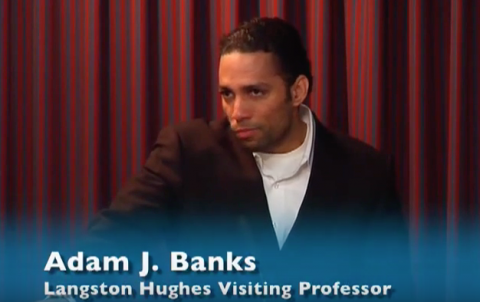
Farmer: Wow, you’re testing my memory!
Peace: Yes! In other words, how do we move forward in insinuating ourselves into the discourse that was never meant for us?
Farmer: Right. That’s an interesting phenomenon. I mean it has to do with a kind of audience agency. We tend to not think of audiences as having agency or potential agency at all. You know the famous formulation in composition studies between audience addressed and audience invoked? Both of those tend to posit the audience as recipients of whatever discourse the rhetor is promoting. But can you make yourself an audience for a discourse that never intended you to be an audience? I think audience agency matters. In fact, at the risk of simplifying things, I believe a number of social movements of the late 60s and 70s occurred when people chose to see the exclusionary discourses of others as addressed to them. For example: “Well, if you’re going to talk about women this way, I’m a woman, and I’m going to answer you because I’m going to make myself an audience to your discourse, and by virtue of you doing that, I’m going to answer you back.” You see what I’m saying? There are conventional exclusions when certain people are not meant to be an audience, but what if they make themselves one? What if you say, “Enough of that. I’m going to be in your audience and you’re going to say this to me, and I’m going to answer you back.” I mean, again at the risk of oversimplifying it, it seems to me that earlier feminist movements, the Civil Rights movement, queer identity movement—members of these groups were no longer content to be talked about but rather insisted on being talked to.
Peace: What is the next big thing in rhetoric and composition in your opinion or the next big turn?
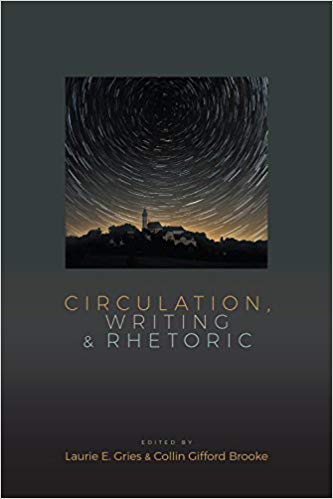
Peace: I just want to talk briefly about a discovery we made in your office as you were packing. You gave HBW a flyer. “All colored people who want to go to Kansas can pay five dollars.” Was that from Nicodemus, Kansas?
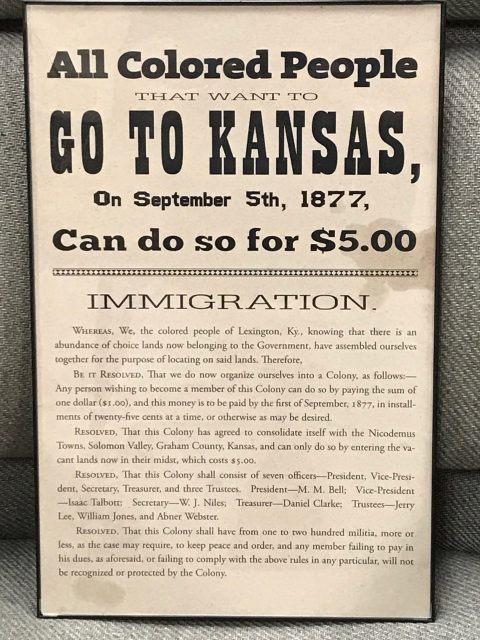 Farmer: Yes, it was a reproduction from a promotional flyer that urged freedmen from Kentucky and Tennessee to find a haven in western Kansas. Nicodemus is a remarkable little town in western Kansas, isolated, and, to my mind, exemplary because of the sheer hardiness and resilience of its first settlers. It is one of the first all-black settlements west of the Mississippi. In 1877, a small group of black people came here to escape the assorted forms of racial oppression that emerged in the wake of Reconstruction. It’s interesting because the sorts of flyer I gave to HBW were pitched to Black people in Kentucky and Tennessee. Nicodemus was promoted as a new promised land, and its biblical resonances are present, as well, in what was called the Exoduster Movement, where a large number of African Americans moved westward in what they believed would be their own Exodus to freedom.
Farmer: Yes, it was a reproduction from a promotional flyer that urged freedmen from Kentucky and Tennessee to find a haven in western Kansas. Nicodemus is a remarkable little town in western Kansas, isolated, and, to my mind, exemplary because of the sheer hardiness and resilience of its first settlers. It is one of the first all-black settlements west of the Mississippi. In 1877, a small group of black people came here to escape the assorted forms of racial oppression that emerged in the wake of Reconstruction. It’s interesting because the sorts of flyer I gave to HBW were pitched to Black people in Kentucky and Tennessee. Nicodemus was promoted as a new promised land, and its biblical resonances are present, as well, in what was called the Exoduster Movement, where a large number of African Americans moved westward in what they believed would be their own Exodus to freedom.
Peace: How did you become interested in Nicodemus?
Farmer: I was very interested in Nicodemus because of the sheer determination of the people and their desire to survive in hostile circumstances. I was also very interested in Nicodemus as an illustration of an exemplary community. In the 19th century, there were experiments in utopian communities, altered communities, intentional communities—New Harmony, IN, Oneida, NY, Shakertown, KY and so on. Nicodemus was different though. It was an intentional community, but one formed of necessity, by the exigence for a freedom following the end of the Civil War that had not yet been experienced. Those first settlers survived, and they did so in an honorable way, with little help from the white communities surrounding them. The inhabitants of Nicodemus, like all black Americans, contended with a racist power structure.
Nicodemus represented an exemplary community that held itself up as a model for survival, and in a larger sense, an example of how to be in the world in a way that stood opposed to all the usual conventions of self-governance available in late nineteenth century America. And maybe too, it was an example of the motivating power of hope—that there could be a better place, that there can always be a better place. It is in this sense that Nicodemus can be understood as a site of “bearing witness.” I use that term in the way that Kelly Oliver understands witnessing—not strictly as a testimonial to the suffering that oppressed peoples experience, but also to the hopeful futures embedded in their very suffering. Witnessing, for Oliver, must always encompass both.
Peace: Do you see work like that as a type of counter-public maybe, an archival counterpublic?
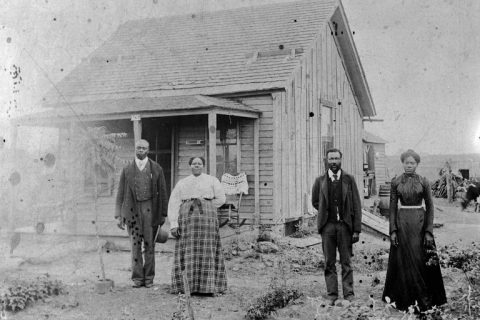
Peace: [So], when you do return to Louisville do you plan on staying active in the rhetoric-composition community?
Farmer: I believe I will, at least for awhile. I am eager to reconnect with old friends who play music and make new friends who do likewise. That’s an important part of my life, and it’s been put on the backburner for too many years now. And playing brings me such pleasure. I might even learn how to play mandolin now that I’ll have some time on my hands. I also want to continue some of the work that we started this last past year with making and maybe look at maker spaces, and meet people who are interested in “making.”
I also feel the need to volunteer or to provide something in terms of community literacy to people or neighborhoods in Louisville. And of course, I’ll read. Fortunately, I won’t have to root for the Royals. But, to be honest, everything is kind of open right now. I know there are some people who plan, in detail, what they are going to do in retirement, but I don’t want to do that. I want to be surprised. I hope those surprises are good ones.
Peace: Right! This is the last follow-up, for my own personal interests. What would your suggestion be for someone who wants to be successful in the field of rhetoric and composition? What is your lasting advice to that person?
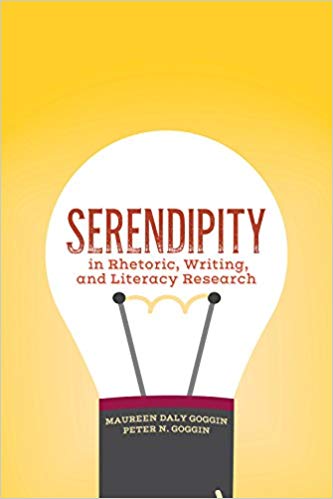
I’m heartened by the fact that Maureen Daly Coggin and Peter Coggin have a new collection that tries to get at this idea. I think it’s called Serendipity in Rhetoric, Writing, and Literacy Research. I can’t wait to read it. And finally, resist complacency. Academic life offers too many occasions that could be mistakenly interpreted as coronation rituals, events where we are tempted to say, “At last! I have arrived! I passed my doctoral defense! I got tenure and promotion! I made full professor,” and so on. These are important milestones in an academic career. Celebrate your accomplishments, then move along. You’ve got to continually challenge yourself—not only for the sake of your career, or for your institution, but also for your own professional growth as a scholar and teacher.
Peace: Thanks again for doing this interview with the Project on the History of Black Writing. We really appreciate this conversation in our efforts to expand and broaden our reach!
Farmer: Thank you, Chris, for this opportunity, and good luck on your progress toward your degree.
For more information on Frank Farmer’s work, visit https://english.ku.edu/frank-farmer.
June 2019
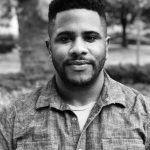 Christopher Peace is a doctoral student of rhetoric and composition at the University of Kansas. Some of his academic interests include African American folklore, myth and rituals, ecocomposition, and the rhetoric of place and space. At HBW he is a member of the Black Book Interactive Project and Black Literary Suite teams.
Christopher Peace is a doctoral student of rhetoric and composition at the University of Kansas. Some of his academic interests include African American folklore, myth and rituals, ecocomposition, and the rhetoric of place and space. At HBW he is a member of the Black Book Interactive Project and Black Literary Suite teams.